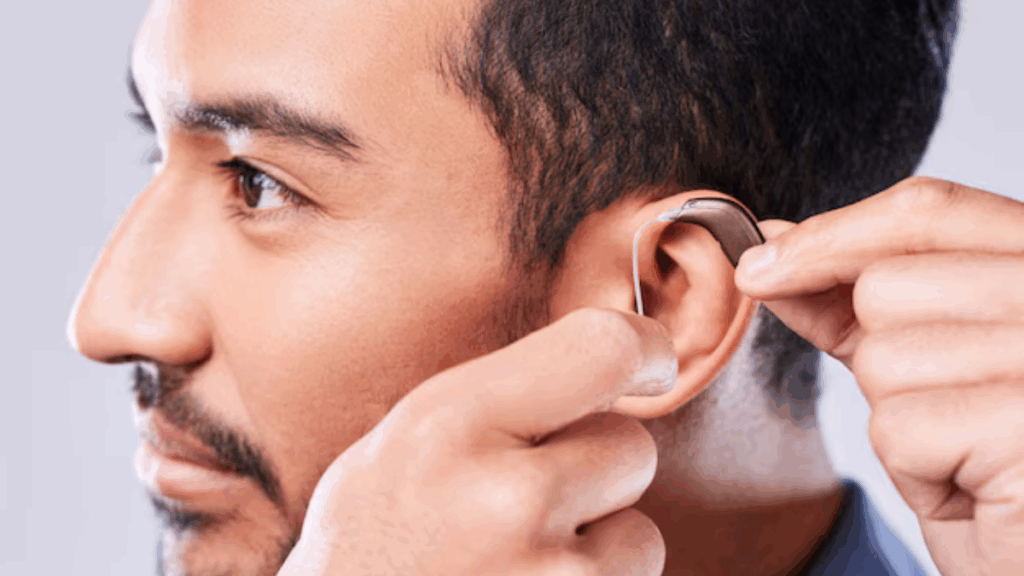
Benefits of Hearing Aids: A Simple Guide to Better Hearing and a Better Life
Many people face hearing loss, but the solution turns out to be simpler than most expect. We’ll explore the benefits of hearing aids and how they can transform your everyday life.
The devices which provide better hearing serve several additional purposes. Hearing aids serve as essential pathways toward living better. These small devices enhance your life through better hearing outcomes while improving brain performance and relationship dynamics, alongside boosting your self-confidence. All levels of hearing loss respond well to contemporary hearing aids, which provide adaptable features that blend perfectly with your everyday life activities.
What Are Hearing Aids and How Do They Work?
Hearing aids are small electronic devices worn inside or behind the ear. They help the hearing-impaired by amplifying sounds, thereby making them clearer. Types of Hearing Aids:
- BTE (Behind-the-Ear): fits behind the ear and is suitable for all levels of hearing loss.
- ITE (In-the-Ear): fits entirely in the ear canal and is easy to handle.
- RIC (Receiver-in-Canal): An elegant one with the receiver (speaker) fitting inside the ear canal.
- CIC (Completely-in-Canal): Almost invisible and the best for mild or moderate hearing loss.
Today, with such gadgets, you can find Bluetooth compatibility, rechargeability, and even AI that adjusts hearing aids automatically to your surroundings.
Related: In case your device gives you trouble, go through our Signia hearing aid problems and solutions guide for smooth working and comfort.
Top Benefits of Hearing Aids
Let’s look at how hearing aids can improve your life in many ways.
Improved Communication
- Touch-feeling conversations with friends and family.
- No more requesting repetitions of conversation or statements.
- Once again, enjoy phone calls, meetings, and public talks.
Better Brain Function
- The studies have proved that hearing loss, if untreated, could very well advance to memory loss and even dementia. Hearing aids thus stimulate brain activity and keep it sharp.
- Additionally, research has shown that hearing aids reduce the chances of cognitive decline in the elderly.
More Confidence and Independence
- Conversations in which you’re left out are now a thing of the past.
- Engage in group activities, travel, and events.
- Feel much more in control of your everyday existence.
Stronger Relationships
- Free flow of conversation with your partner, children, and coworkers.
- Dispense with any forms of misunderstanding and awkward moments.
- Better bonding with the ones surrounding you.
Enhanced Safety
- Hear horns from vehicles, alarms, and emergency alerts.
- Be aware of your surroundings when crossing the street or walking.
- Reduce falls and accidents at home.
Improved Mental Health
- Hearing loss often leads to sadness, stress, or loneliness.
- Hearing aids lessen the effects of isolation and increase your mood.
- You’ll feel more at ease and happy.
- Healthcare Tracking Capabilities
Some smart hearing aids monitor:
- Your physical activity
- Your heart rate
- Your steps taken each day
- These features help you stay healthy and informed.
Who Should Consider Hearing Aids?
Hearing aids are not reserved for seniors. You should consider getting hearing aids if you:
- Have difficulty hearing when engaged in group conversations
- Frequently ask others to repeat themselves
- Turn up the TV or radio to a volume that your friends or family consider too loud
- When listening, your mind often feels tired the longer you go through repeated listening
- Are avoiding social situations because of hearing issues
How to Choose the Right Hearing Aids For Your Needs
Below is a step-by-step guide to follow:
- Step 1: Take a hearing test. Either see a licensed audiologist or use a reputable hearing test app to find out what your hearing level is. A professional test can better assist you in determining what type and level of hearing loss you have.
- Step 2: Get a professional recommendation. Receiving assistance from a hearing professional during this process will be helpful. Audiologists will provide you with recommendations for styles based on your ear shape, comfort level, and listening needs.
- Step 3: Try on multiple models. You must always try on multiple models before making a selection. This is the best way to be sure that you do not run into common hearing aid problems, such as poor fit or uncomfortable feel, unclear sound, or feedback noise. You should choose a device that feels right and performs well in the real-world setting where you want to get the most useful purpose of wearing it.
- Step 4: Check the smart features. Decide if you want Smart features like Bluetooth for phone calls, rechargeable batteries for convenience, and AI that automatically changes sound based on the listening environment.
- Step 5: Compare prices and warranties: Shop around and find a good quality and budget price in the selection, with solid after-care support and warranty.
Conclusion
Living with hearing loss is difficult, but it doesn’t have to be. The benefits of hearing aids are beyond the improvement in communication, they include improved cognition, enhanced safety, and a happier life.
Don’t wait! Take control of your hearing health today by visiting your local trusted hearing aid centre. Trained professionals can walk you through the processes of testing, fitting, and selecting your appropriate device.
Don’t wait! Take control of your hearing health today!
Frequently Asked Questions
On average, hearing aids last between 3 to 7 years, but it depends on care and use.
Removing your hearing aids before sleeping is the best way to protect both your ears and the aids.
Some hearing aids require disposable batteries, while some are rechargeable.
Some health plans cover part of the cost; contact your provider for details.
Hearing aids will improve your hearing ability, but they may not return sounds to normal hearing.
Dr. Harshi, is an accomplished Audiologist with extensive expertise in treating individuals with hearing impairments.

